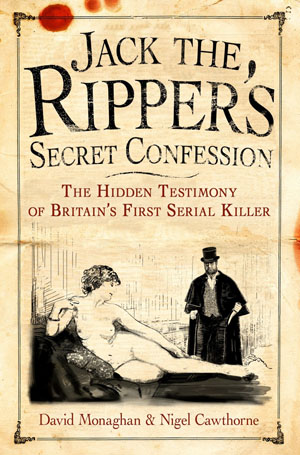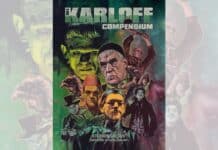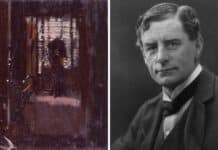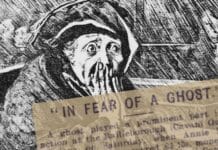Guest writer ADAM GREENWOOD reviews “Jack the Ripper’s Secret Confession: The Hidden Testimony of Britain’s First Serial Killer” written by David Monaghan and Nigel Cawthorne.
For the best part of 20 years, I have been intrigued by the case of Jack the Ripper, particularly the many theories on the identity of the killer or killers.
When I picked up this book I was intrigued as here was a suspect I had never come across before. The more I read, however, the more convinced I became that said suspect was categorically not the Ripper.
Jack the Ripper: The Facts
The facts in the case are as follows.
Between August and November 1888, five prostitutes were murdered in the East End of London and their bodies horribly mutilated.
It was believed that a single killer was responsible for these crimes and this shadowy figure was known as “Jack the Ripper” in the media and public imagination.
The killer or killers were never caught and their identity has remained a fascinating mystery ever since.
Around the same time, another mysterious figure known only as “Walter” was publishing, in instalments, an account of his life and sexual exploits, written to titillate other Victorian Gentlemen. There has been some debate amongst scholars as to the identity of Walter and whether this extensive work should be considered an autobiography or a novel and opinion remains split. It is the contention of this book that Walter and Jack the Ripper were one and the same.
So, what are the clues that lead the authors of this book to conclude that the mysterious Walter was also the Ripper?
The simplest and most plausible reason given is that these two individuals were known to be active in the same place at the same time and, while he mentions many other national events and incidents which were deemed newsworthy at the time, Walter makes no mention of the Ripper or his crimes.
This argument from silence suggests that Walter did not want people in general linking him with the crimes but that clues were left for those who knew how to look. This, I fear, is where the argument starts to fall down.
First of all, many chapters of the book are dedicated to providing evidence of Walter’s taste for young teen girls. Certainly, in his youth or when he was short on funds he would go with any woman who would have him, regardless of their age or attractiveness but his preference was always for pretty young girls.
Of the five Ripper victims, however, four were over forty and not noted for their beauty. When reading these chapters, I was a little confused as to what point the authors were trying to make as this seemed to me to be far more evidence against Walter being the Ripper than for it.

To establish motive, there are a few incidences given of Walter being tricked by prostitutes and their pimps or of various unfortunate women and girls falling foul of his violent temper. It is true that Walter often ends such stories with the rather ominous “I do not recall ever seeing her again.” This, the authors suggest, is one those little clues he provides to the truth. If the case was being made that Walter may have also been an unknown murderer then this could certainly be used to give credence to the theory but as evidence of Walter being Jack the Ripper it seems terribly thin.
Much is also made in the book of Walter being a sexual sadist. He gleefully describes the pleasure and thrills he derives from inflicting pain and fear on women and, on the surface, this would seem consistent with the Ripper’s behaviour as what made the murders so shocking to the public in that summer and autumn of 1888 was the horrible mutilations inflicted upon the victims.
However, one fact about the Ripper murders which has intrigued and puzzled investigators is that all the mutilations were carried out after the victims were dead and it seems that they were killed quickly with a deep cut to the throat from behind, leading many to puzzle over the motives for the mutilations. Surely, if the killer was a sadist like Walter he would have tortured his victims and killed them slowly. I see this as a significant difference between the two rather than a similarity.
In the most bizarre piece of “evidence” in the book, the authors look at some of the “Jack the Ripper” letters, most of which were treated with suspicion even at the time, then see how many of the words used also occur in Walter’s work. As none of the words used for the comparison seemed particularly uncommon (such as “Hell”) all this particular chapter seemed to prove was that the two spoke the same language and knew a lot of the same words! Hardly enough to convict someone beyond reasonable doubt.
You would be forgiven, reading this, for thinking that I did not enjoy the book but I did. I found it a fascinating exploration of the dark, hidden underbelly Victorian culture and it inspired me to want to track down and read “My Secret Life” to find out more.
I just did not find the connection to Jack the Ripper to be particularly plausible. Walter comes across as an interesting and disturbing enough character to be worthy of his own book without needing to be linked to arguably the most famous criminal of all time.
But then, I suppose, I would not have picked up and read the book in the first place. I definitely recommend this book to anyone who wants to learn more about the darker side of history but, I must say, anyone looking for new information or clues to the identity of Jack the Ripper will come away disappointed.
Adam Greenwood is an author and speaker living in Nottingham, currently working on his third novel. His first two novels, along with a non-fiction work on Faeries and the associated folklore are published by Saint Claire Press and available from Lulu.com Check him out here.







